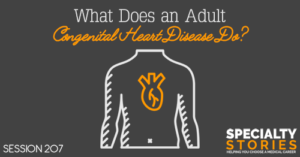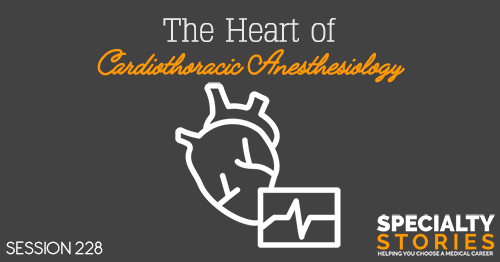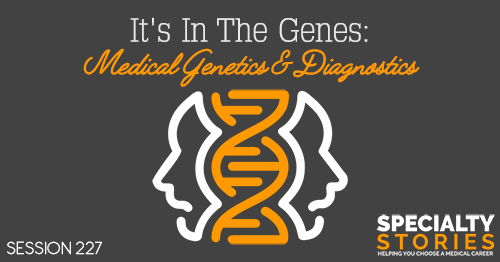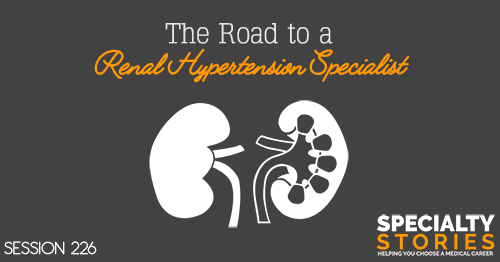Apple Podcasts | Google Podcasts
Session 207
Dr. Laith Alshawabkeh to learn all about adult congenital heart disease. We discuss patient population, day-to-day life, training pathway, and more!
Adult congenital heart disease is a great subspecialty of cardiology to help these patients as they continue to age through their life. This is one of those newer fields and Laith is a trailblazer out there creating programs and setting the tone for all the trainees in the years to come. If this is something you’re interested in, check out Adult Congenital Heart Association.
For more podcast resources to help you with your medical school journey and beyond, check out Meded Media.
Listen to this podcast episode with the player above, or keep reading for the highlights and takeaway points.
[01:47] Interest in Adult Congenital Heart Disease
Laith had no idea this specialty existed as he was going through med school, residency, and a good part of his general cardiology fellowship training. In med school, he knew he wanted to be a cardiologist. Then in residency, he developed an interest in interventional cardiology, having worked with a mentor who was an interventional cardiologist on research.
He started exploring and did a rotation with pediatric cardiology at the end of the second year of his three-year fellowship. And he loved how it challenged everything he thought he knew about physiology anatomy.
Right there and then he knew what he wanted to do. So he did an away rotation in adult congenital heart disease for a month in Boston, and he fell in love with it even more.
[04:24] Types of Patients
Laith says that the turning point in cardiac surgery was when the heart and lung bypass machine was invented at the University of Minnesota. Prior to that, he explains that you couldn’t really operate inside the heart. You could operate inside the chest and few people have done it. But you can’t really repair and fix legions or shunts inside the heart itself, otherwise, you would have to stop the heart to do that.
The field piggybacked on the technological advancement of the heart-lung bypass machine and innovative surgical ideas that had been developed way back when they were finally able to be applied to the bedside.
It took about 30 years or so of improvements of these original ideas, following up outcomes, until the survival of babies born with congenital heart disease substantially improved.
“By the year 2000, the expectation was 95% of kids born with congenital heart disease would make it into adulthood.”Click To TweetThis rapid explosion of medical breakthroughs to treat congenital heart disease allowed the vast majority of these kids to become now adults. As a result, it also created a massive need for adult cardiologists trained in this specialty to take care of them.
They are specialized in taking care of adults who, as kids, either went through procedures or had whatever congenital heart disease they have and are now in adulthood. So they have the specialty training to continue to take care of them as they keep getting older.
Laith says a lot of them will require repeat operations, interventions, special imaging, and special care. If they become pregnant, they need a special delivery plan. Or if they need their appendix removed, the anesthesiologist needs to talk to them and develop a plan for them to put the patient under anesthesia. And so, there’s a lot of lifelong care required for these patients.
[07:52] Traits That Lead to someone Being a Good Adult Congenital Heart Disease Specialist
Laith points out that it’s important for any budding physician to seek curiosity at an earlier stage and not to make up their mind too early.
In every step they make, make sure that downstream, you have a lot of options if you were to explore what niche really addresses your needs.
You have to work hard to gain their trust for them to open up and allow you to become the privilege to become their physician. This is something that you as a student now, a physician later, would be doing for the rest of your life. So you have to be happy with what you’re doing.
Laith explains that even acquired forms of heart disease, like coronary artery disease, and so forth, have to do with genetics, not just acquired habits.
But for his patient population, it’s intriguing how they’re being forced to self-reflect into their own existence and ultimately, mortality at a very young age. And it’s remarkable how it allows them to have clarity and wisdom as they carry on with life. So Laith cherishes a lot of the conversations with his patients around that.
[13:39] A Team Effort
Laith says treating congenital heart disease is a team effort. They have coordinators, social workers, and nurses who help take care of their patients. Similarly, the patients will bring in either their parents or their loved ones for support.
But also, just walking into an office sometimes can bring about some of those anxieties. And so, it’s really difficult for many patients to retain information during the medical interview when you counsel them on stuff.
[15:20] Typical Day
Laith says Adult Congenital Heart Disease is an evolving subspecialty. So if you graduate fellowship in this specialty, there are a lot of opportunities to start your own program.
That’s what he did after finishing his fellowship in Boston and moving to San Diego. He set up an adult control health program at the University of California, San Diego. A lot of his work involves administrative, programmatic building, and hiring staff, taking up one to two days of his week. The rest of his week is clinical care and research.
For clinical care, he sees patients in the office or in the hospital when they come in for their surgeries or procedures. He does rounds. He works with his pregnant patients for nine months, and sometimes longer, to help optimize their cardiac status in time for delivery.
He spends a day in research each week. He set up the database for research for their program, collaborating nationally with different institutions. The incidence of congenital heart diseases is 1%. It is fairly common, but you still need to pull data from several centers to conduct meaningful clinical research. So they collaborate a lot with a lot of institutions nationally and internationally in research.
This two-year fellowship was not an ACGME-accredited when Laith started in 2015. Then in 2016, the fellowship became ACGME-accredited. They came about with a new accreditation, which Laith grandfathered into the ACGME. So he was the first graduating class that was ACGME-accredited.
[17:56] Sub-Interests Within the Sub-Specialty
Laith says he doesn’t perform a lot of procedures performed although he does a lot of non-invasive imaging. He does imaging support for interventions and some of the procedures with them in the cath lab evolve around imaging.
'The cool thing about this subspecialty is you can actually develop a specific interest during those two years.'Click To TweetFor those who are really interested, sometimes you can extend your training even further. If you would like to do interventions on the patients in the cath lab, that’s a pure interventional pathway. There is also a noninvasive pathway, which Laith did. It has to do with advanced imaging, 3D modeling for patients’ hearts.
Other pathways include electrophysiology, which is fairly procedural heavy, as well as clinical bedside care. And so there are ample opportunities even for developing sub-interests within this advanced sub-specialty.
[19:08] The Training Path
Laith explains that people come to Adult Congenital Heart Disease from either the pediatric or adult pathway.
Coming from the adult pathway, you do adult internal medicine, followed by adult cardiology and then adult congenital heart disease. Laith spent a significant proportion of his training at the pediatric hospital in Boston, learning the native legions and the things that weren’t part of his training as a general adult cardiologist.
Whereas if you were a pediatric cardiology trained physician, you would spend more time at the adult hospital gaining some of the experiences that adult cardiologists gain during the general fellowship. Then apply it to your population of adults with congenital heart disease.
In a nutshell, it takes around 13 years to get into this subspecialty. It includes four years of medical school, four years in Internal Medicine, three years in Cardiology, and then two years of Adult Congenital Heart Disease fellowship.
[20:48] A Very Long Pathway
From a mental standpoint, where students who hear are concerned about the length of time the training takes, Laith says the ACGME would have to contend with the super sub specialization in general.
Every subspecialty requires dedicated time on a fellow or trainee’s salary. As a trainee, you are being paid a salary. And as you advance, that salary increases, and obviously, substantially lower than that of a practicing physician. At the end of the day, Laith says it’s a balance between financial and personal interest needs.
And so, if you are someone who has overwhelming financial responsibilities, and you don’t have specific needs, that’s an easier choice. Then you would go to a pathway that offers you with that income. And at the same time, you would enjoy it and be happy.
And if you are someone who likes to engage in a specific sub specialty, balance what pathway gets you to your goal in the shortest, more efficient way. Who knows, things may change in the future where people if they declare their interest, they would shorten their residency or fellowship training.
'Remember, the more you love what you do, the more you're likely to excel and advance in your job.'Click To Tweet[23:50] Taking Calls
Laith says that as a consultative service, they don’t spend nights in the hospital for in-patient day-to-day operations.
When he started the program, he was on call from home 24/7, but he doesn’t get calls every night.
Working at a big academic center, they have in-house fellows as well as an in-house general cardiology service. So they call him with specific questions regarding the congenital heart disease aspect of the patient care. And this is how the call is set up for most of the adult congenital heart practitioners.
[25:14] How to Be Competitive for Fellowship
Laith stresses the importance of picking the right mentor early on in your career in med school. As you’re going about your clinical rotations, he strongly recommends that you pair up with physicians who are clearly in love with what they do. And you can’t miss those because you can see that they’re very happy. They’re happy to teach and they’re happy to take care of patients. They’re dedicated and well-balanced overall.
Those people are more likely to inspire you into finding your own calling, not to do what they do. But to basically learn by osmosis from these people. Laith assures there are a lot of those around in every subspecialty.
He adds that even though it may sound like a super subspecialty, the field is vast. As you go to internal medicine, residency, or pediatric residency training, you are still going to experience and explore a lot of different subspecialties so have an open mind.
And if you’re still interested in cardiology, spend time in your research and in your clinical rotations with cardiology physicians. Again, find people who are very happy doing what they’re doing. And as you advance into cardiology fellowship, you also have to have an open mind. The first year offers you ample opportunities to do that.
'Experience every subspecialty cardiology has to offer before you make up your mind.'Click To TweetAnd once you develop your career pathway and decide to do adult congenital heart disease, the rest is fairly standardized. You apply in a regular fashion. There’s a matching program where you roll around the country in your interview.
There are approximately 15 to 20 training slots in Adult Congenital Heart Disease training throughout the country. Laith says they’re reasonably competitive, which is good. But at the same time, they’re very selective in making sure they train fellows who are able to lead programs or pick up the mantle and continue advancing the field at places that do not have clinical care.
[28:22] Message to Osteopathic Students
As a foreign medical graduate, Laith grew up in Jordan, moved around the world, and ended up in Egypt in medical school where he got a full scholarship. Then he moved to the U.S.
There’s bias everywhere. No matter where you go. You will encounter people who are biased against you. Just remember, again, attract positive energy.
'Pair yourself with people who are going to propel you forward, not push you down.'Click To TweetIf you feel like like you’re trying too hard to appease two people, then that relationship is not working. A mentorship relationship has to be mutually beneficial. For the mentor, it’s the feedback and the joy of mentoring young stars. And for you, the student, it would be gaining wisdom, insight, and drive in what you want to do.
Laith adds he has a lot of colleagues who went through the osteopathic pathway and are adult congenital heart disease cardiologists.
Once you train in advanced subspecialties, all this stuff that you thought was monumental fades away into the distant past. And what you have left is your career and your patients at your hands. So don’t let that stuff drag you down. Just keep pursuing your passion and you’ll achieve your goals.
[30:36] Message to Future Primary Care Doctors
Laith clarifies that there is no cure for congenital heart disease, at least not yet. Even if the patient may tell you or the family may tell you “the heart has been repaired,” it’s only called palliation. Even though they had surgery, they still are at risk of complications later in life and they require lifelong care.
So if you see a sternotomy scar or if they tell you they’ve had surgery as a child, go to the Adult Congenital Heart Association website. It lists all these centers that have an organized program to take care of adults with congenital heart disease. Usually, in most areas, there is a center within driving distance.
[31:38] What He Knows Now That He Wished He Knew Before
'In medicine, you are going to create your own destiny. And the idea is to develop tenacity and resilience, not stubbornness, but resilience.'Click To TweetLaith can’t stress enough how mentorship can have a huge impact on your career. So he strongly advises people to seek it out. Even if you’re at a place where you don’t think there are adequate mentors to the things that you want to do. You can connect with anybody internationally and in the entire world in this day and age.
Go to conferences. This is a fantastic venue for you to meet and bump into people and talk to them. Otherwise, these people are super busy. And they are not going to give you their time during their work hours.
Check at your city if there’s any conference in whatever subspecialty you’re interested in, and just go there. See what it’s like, hear the experts talk about their experiences, their clinical problems, see how they debate and interact with each other.
Don’t be afraid to introduce yourself and say you’re looking for guidance and mentorship. And it doesn’t matter what level of training you are. Again, if you identify the right person, that person will help you achieve your goals.
[33:49] The Most and Least Liked Things
What he loves most about his specialty are the patients and their interactions for he has built a very strong relationship with his patients. It’s what makes it worthwhile that you can’t put money on it.
On the flip side, what he likes the least is the challenge of balancing his time. Laith points out that you have to have the attitude wherein you can’t function unless you are a happy person outside of work, too.
'There's a period of adjustment between your career and your personal life so you have to be open-minded about it.'Click To TweetIf people are happy, then that’s a healthy environment to be in. And that’s just going to set you up for success in your job or fellowship, even training. If that place is not, then there’s a good reason usually. So you have to be careful with that.
Lastly, Laith reminds everyone to never lose perspective. Family always comes first, and the job will figure itself out.
[35:53] Major Changes Coming to the Field
Laith makes it a point to attend the pediatric meetings because he wants to know what these guys are doing. Laith says he hasn’t seen a lot of these procedures on kids born with congenital heart disease nowadays because they were not done when his patients were born.
Every 10-15 years, you get new waves of patients who underwent innovative new breakthrough surgical repairs or transcatheter repairs. Those are going to influence their physiology and subsequent risk of complications later in life. And so, you can take some of those advances and apply them to adults currently.
[36:51] Final Words of Wisdom
If he had to do it all over again, Laith says he would still choose to be an adult congenital heart disease specialist.
Finally, he wishes to tell everyone who may be interested now in this newfound specialty that they’ve never heard of to reach deep within your soul. Think of the things that actually make you happy. And if you can apply them to your needs and expectations for your career, then that’s great. But a lot of people just don’t know yet, and it’s okay.
The best way to gain that insight is by experiencing so don’t be afraid to experience.
Experiences are not going to come to you by researching online, and probably are not going to come to you by talking to your peers. You really have to go out there, attend conferences, do elective rotations, seek out specific specialties you think are of interest to you. Try them out, see how they’re like, you’d be surprised how much wisdom you’ll gain very quickly.
By doing that, and how much quicker and more efficient, you are reaching your end game, which is, what exactly is your specialty of choice for your future career.
Links:
SEARCH SITE
LISTEN FOR FREE












